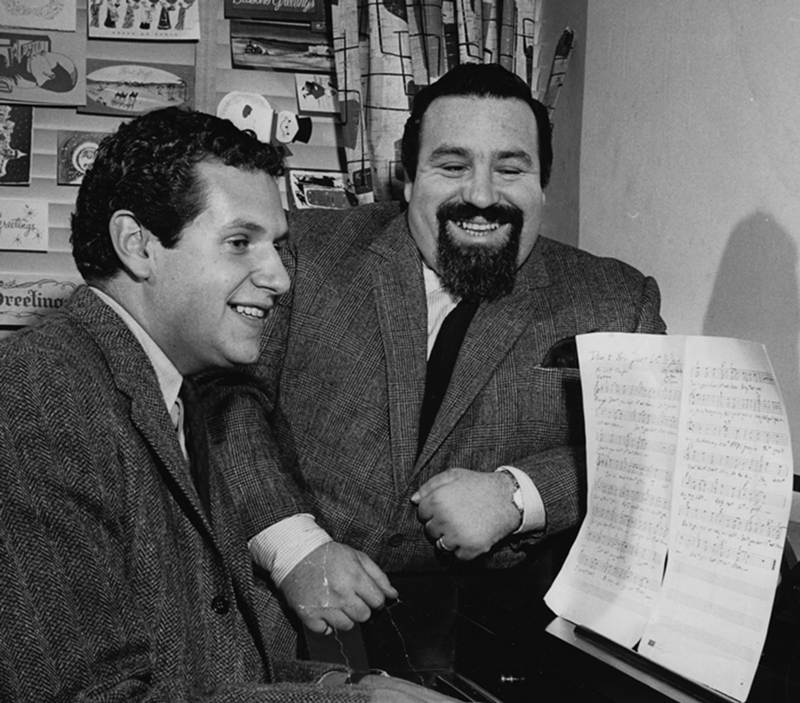It’s been a long, slow journey for Doc Pomus — who died in 1991 without being widely known by the public — to become recognized as one of Rock & Roll’s greatest songwriters ever. But his cause has gained much momentum recently.
One key element is the recent documentary AKA Doc Pomus, which plays Friday at The Carnegie in Covington as part of the current Cincinnati ReelAbilities Film Festival. It is followed by a tribute concert for Pomus featuring local acts The Hiders, Magnolia Mountain, The Perfect Children and DJ Mowgli.
“Doc’s songs just have a lot of soul,” says Magnolia Mountain’s Mark Utley via email. “That’s why they’ve stood up for so long.”
The ReelAbilities festival presents movies that highlight the abilities of those considered “disabled.” Pomus was confined to crutches and a wheelchair all his life because of childhood polio and a later accident.
A Brooklyn-born Jewish youth who loved African-American music, as a teenager he managed to become a popular stand-up (on crutches) Blues singer in New York clubs.
He then went on to write the lyrics (often with Mort Shuman providing music) to numerous classic hits by Elvis (“Little Sister”), Ray Charles (“Lonely Avenue”), The Drifters (“This Magic Moment”), Dion (“A Teenager in Love”), The Mystics (“Hushabye”) and many more. He and Shuman were one of the key songwriting teams of the Brill Building in the 1950s and early 1960s, when professionals in cubicles in Manhattan wrote hits for hot young groups and teen idols.
Later, even though married with a home and family in Long Island, N.Y., Pomus used his Manhattan hotel room as a salon for Rock, Soul, Blues and other music lovers, and served as inspiration for Lou Reed, Jimmy Scott, Dr. John, Bob Dylan and many others.
In the 1970s and 1980s, he provided new songs for such mature Pop, Soul, Jazz and Blues musicians as Walter “Wolfman” Washington, Dr. John, Johnny Adams, Willy DeVille, B.B. King, Irma Thomas and Ruth Brown, adding an important final chapter to his work.
Will Hechter, who along with Peter Miller directed AKA Doc Pomus, first became interested in his subject because of his songs. He worked with Pomus’ daughter on this film.
“I didn’t know that much about him,” he says by phone, calling from Toronto. “But I grew up with the music he had written, and I always was interested in the Brill Building. As I learned more about Doc Pomus and his own struggle in life, I came to admire him very, very much.”
“He had polio and struggled with that his entire life,” Hechter continues. “As [Jazz singer] Jimmy Scott says in the film, he didn’t take a cab around New York. He took a subway everywhere. Here’s a guy going up and down in subways on crutches.”
And, he says, Pomus came to use his lyrics not as pure commercial confections but as windows into his life’s fears, struggles, hopes, dreams and suspicions.
“Most of the lyrics he wrote clearly expressed how he was feeling in his own life,” Hechter says. “We feature a lot of his writing from his journal in the film and I think it’s really poignant. Hopefully it will give inspiration to lots of people.”
Pomus has also received renewed attention because of Bob Dylan’s January speech accepting the Person of the Year Award from MusiCares — the National Academy of Recording Arts and Sciences’ charity for musicians in need. There, he praised Pomus as a key early influence.
But he first dissed two other much better known Brill Building songwriters, Jerry Leiber and Mike Stoller, who were also producers. They supplied material for the R&B act The Coasters, whose humorous songs included “Yakety Yak” and “Charlie Brown.” Evidently, they didn’t like Dylan upon first hearing him.
“Novelty songs — they weren’t saying anything serious,” Dylan said of them in his speech. “Doc’s songs, they were better. ‘This Magic Moment.’ ‘Lonely Avenue.’ ‘Save the Last Dance for Me.’ Those songs broke my heart. I figured I’d rather have his blessings any day than theirs.”
Hechter doesn’t agree with Dylan on Leiber and Stoller. “I think they were great artists and producers and good friends of Doc Pomus,” he says.
But he is pleased that Dylan is such a fan of Pomus. “I happen to know he saw the film and loved it,” he says. “Obviously, he had a lot of respect for Doc Pomus.”
Cincinnati ReelAbilities Film Festival presents AKA DOC POMUS and a tribute concert at 6 p.m. Friday at The Carnegie in Covington. More info and tickets: cincyra.org.


